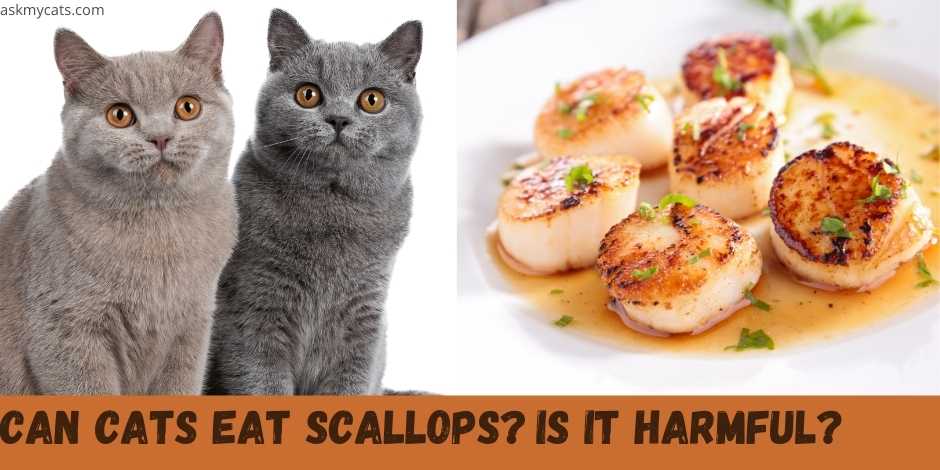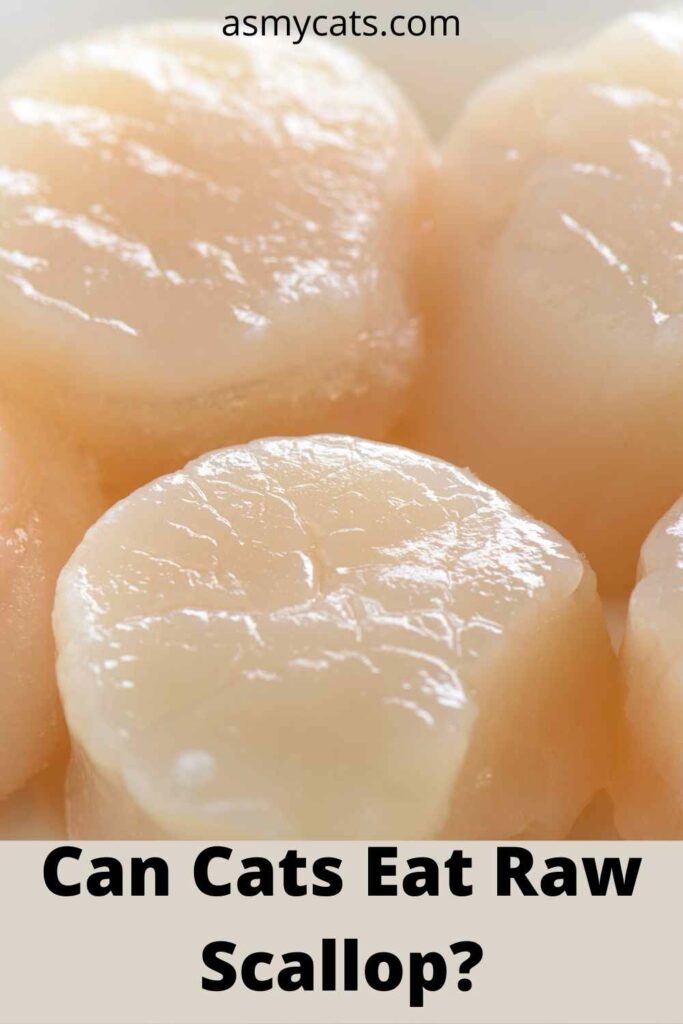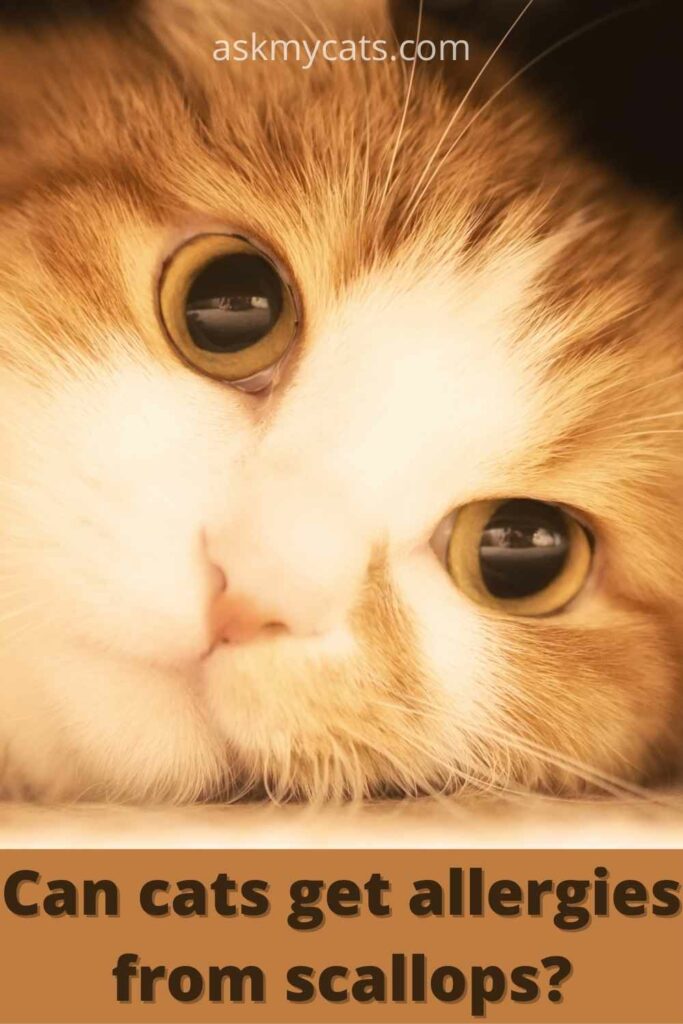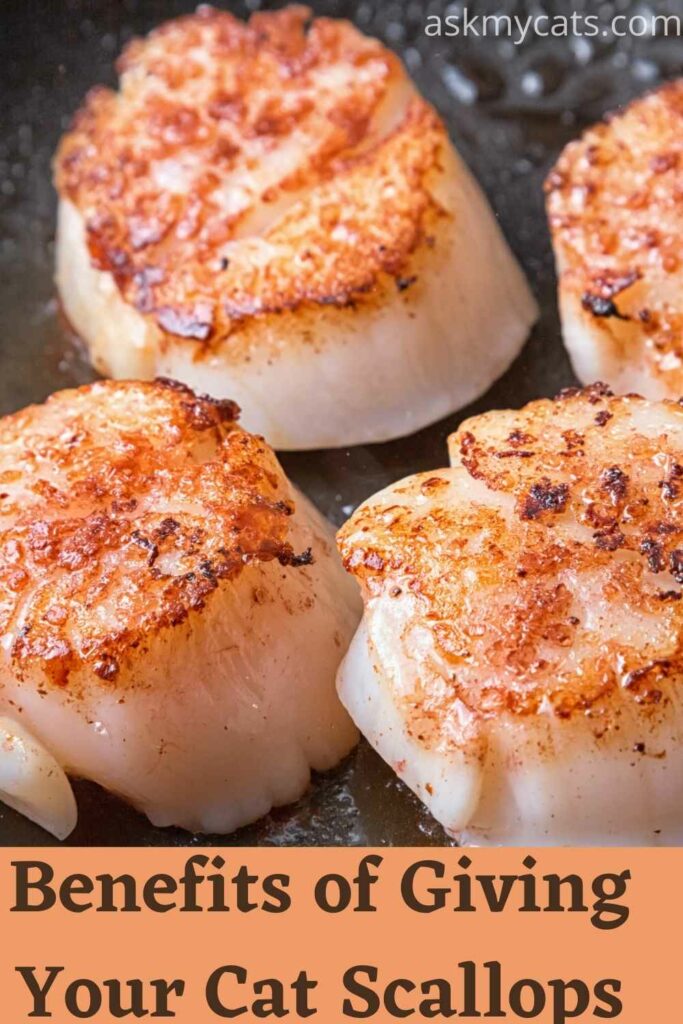Have you ever thought about how vast the variety of seafood is? Is it equally beneficial for our felines? I know being a cat parent, you come across such questions every alternative day and happen to be stuck around the question that is, should I let my cat eat scallops?
Before stepping into that part of the spectrum, you should know that it’s been forever since the controversy related to scallops has been surfacing but there hasn’t been any evident information which today, we are going to find relevant answers of.
Let me commence by adding whether cats can eat scallops or not? So the answer would be, cats can eat scallops but that in moderation and cooked without any added preservatives.
So, without any further a due, get your notepads and get a seat.


Give Your Cat the Perfect Day
Get the Free Ebook!
Are Scallops Safe For Cats?
Scallops are safe for cats and non-toxic as long as it is cooked thoroughly.
Scallops are highly nutritious considering the nutrients they possess and they cannot make your feline prone to any disease or illness as seen in the long run.
However, the thing to consider and keep in check is that the cooked scallops shouldn’t comprise of any added substances or preservatives such as garlic, tomatoes, onions, salt, and sauce which are considered extremely hazardous for a feline if given in high amounts and if exceeds the daily intake value.
Also, you shouldn’t make any addition to a feline’s diet if it is going through any ailment as it can be triggering to the existing symptoms, and also may exaggerate them.
Are Scallops Toxic For Cats?
Scallops are bivalve mollusks comprising of shell and meat which is often eaten by humans by cooking, grilling, and frying. Many people derive the supplement nutrients from scallops by adding them as an extra meal, while when it comes to felines it is non-toxic for them too and can be given to them by cooking it thoroughly.
Giving scallops should only be considered when your cat has been eating a staple diet consisting of every nutritional value. Scallops shouldn’t be given as a whole diet as it will ensure the intake to exceed that might make your cat uneasy and also end up in diarrhea or vomiting.
Furthermore, some felines are seafood intolerant and don’t like to have such complex sea-food diets which should make you a little apprehensive before making such decisions.
Can Cats Eat Raw Scallop?

Raw food shouldn’t be the choice for you to give your cats as raw scallops have the high possibility of comprising salmonella which can make a feline ill.
Scallops that come from dirty water have heavy metals such as cadmium, arsenic, mercy or lead accumulates into them, there is a vast chance these substances will turn out to be toxins and be hazardous for a cat.
It also has thiaminase that can cause foodborne diseases.
Scallops considering come from the sea should be thoroughly cleaned and checked if raw or not as there is always a high probability of it being full of bacteria that can be fatal for a feline as they have sensitive digestive systems and are very prone to contract diseases.
Can Cats Have Cooked Scallop?
Cats should only be given cooked scallops as cooking the scallops by boiling, and steaming makes the bacteria and parasites dissolve by turning it into a healthy choice. Cooked scallops deprive thiaminase that will not break down vitamin B1 which will assure no deficiency complications in a feline.
While mentioning cooked scallops, you should keep in mind that it should not include any sauces, garlic, onions, etc as it can in most cases disrupt a feline’s digestion making diarrhea and vomiting common to appear.
Furthermore, scallops are made for humans making them a portion of food only suitable for them and not that nutritious for felines as even after cooking them, it wouldn’t be that beneficial or fruitful for your feline and will not fulfill their needs.
Can Cats Get Allergies From Scallops?

Cats can get allergies from scallops as usually cats are seafood intolerant and can discover many allergies such as
- Diarrhea
- Vomiting
- Lethargy
- Itching
- Redness
- Hair loss
Such seafood can be harmful to certain parts of your cat’s body which can make a feline prone to getting diseases.
Some seafood also comprises great sodium that exceeds the sodium intake a cat is advised to have.
These allergies are said to persist for 2 or more days and get settled with time but if it doesn’t, it should be your precedence to take your feline to the veterinary on an urgent basis.
Benefits of Giving Your Cat Scallops
When it comes to feeding cats scallops, a lot of people are skeptical because of the benefits it possesses for their health, today we are going to learn about some of such benefits here that can be helpful in the long run.

1.Vitamin B12
Vitamin b12 is the essential nutrient that a feline needs for its digestive, nervous. It is also necessary for their cognitive system to stay healthy and well. It is crucial and should be given in accurate amounts to balance down all the contents that go inside their body
2.Omega3 Fatty Acids
Scallops have the presence of omega -3 fatty acids that have inflammatory properties which is actually a great choice for cats who have allergies or dry skin or also soothes hotspots.
3.Potassium
Potassium usually acts as a supplement in case your cat is potassium deficient. It also is essential to major body functions carried out by nerves and muscles. Potassium is crucial to keep your cat from any fatal occurrence as deficiency of it leads to interrupted vital organs.
Risks Of Giving Your Cat Scallops Often
even though scallops are very healthy and comprise every essential nutrient that a cat needs to sustain healthily, however, there are pretty great chances of it turning out unhealthy once it is given in excess so to say, when it exceeds the total food intake.
Most of the time, scallops are eaten by humans by cooking and grilling them in oils, adding seasonings that increase the fat value of the scallop which when fed to cats can increase their sodium levels, also giving them obesity which often ends up in restlessness, heavy breathing.
Furthermore, scallops are non-toxic and cannot be fatal for a cat, but when it is given in every alternative day in its raw form, it is going to give your feline shellfish poisoning and in worse cases, it can be fatal too if goes undetected.
Frequently Asked Questions
Are shrimps okay to give cats?
Shrimp should be given to cats after cooking without any seasoning, added fat, and oil as the raw shrimps can have fungicides, chemicals, and antibiotics that can be hazardous for the feline in adverse ways possible.
Is it okay to serve frozen food to the cat?
The frozen diet usually includes bones and organs which can also help your cat’s digestion. You can serve such frozen foods by adding water or not in order to hydrate them.
What kind of fish should be given to cats?
Small fishes like cod, halibut, and flounder are Safe for cats as these fish’s bodies contain less mercury.
Can cats eat octopus?
Cats can eat octopus in small quantities or as a small treat in their diets and not as a staple food. It contains protein, fats, vitamins, and many other essentials like magnesium, iron, phosphorus, and selenium.
Final Words
All along with this article, we have come to know that scallops are free of any toxins and can be given to felines as an additional diet supply. Scallops are also said to comprise many essential nutrients that a cat’s system requires to function well and keep them circulated with all the essentials.
Although, we have also found a brief conclusion that it’s only better to provide the scallops in their cooked form without any added preservatives to not disrupt the flow of necessary nutrients to their body.
Now, let me sum it all and drop some questions for you to answer and also look forward to reading about others’ answers too, exciting right?
Okay, so when was the first time you fed your cat scallops? How it reacted?
Come, I am finding your answer in this comment section
